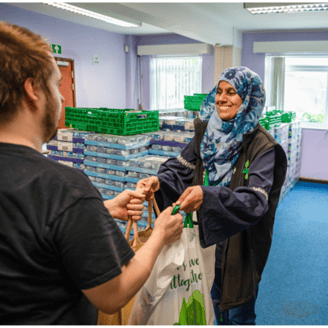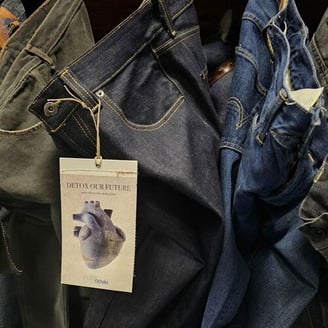Christina Hajagos-Clausen from IndustriAll on the minimum wage situation for textile workers in Bangladesh
Bangladesh is experiencing major social unrest over the renegotiation of minimum wages. Textiles and clothing, the country's leading industry, is at the heart of the social movement. Although safety conditions in Bangladeshi factories have improved, the repression of trade union activity has accelerated over the past year, while wages are being kept artificially low, according to Christina Hajagos-Clausen, who is in charge of the textile industry at the international trade union federation IndustriAll.

FashionNetwork: The Bangladeshi textile industry is often affected by social unrest over wages, but the recent protests have been particularly well attended in the sector. How do you explain this?
Christina Hajagos-Clausen: In Bangladesh, the minimum wage is reviewed every five years. Through a mechanism controlled by the government, which brings employers and unions to the table. I think that the main reason for this conflict is the inflation affecting this country, which is known for its low production costs. This inflation is all the more severe because workers have no access to sectoral bargaining. The vast majority of the country's 1.4 million textile workers have seen the pay rise agreed five years ago eaten away by inflation. As a result, they remain on poverty wages.
FNW: The Prime Minister has given a firm response to the strikers, encouraging them to accept the proposed increase or "return to their villages". How do you interpret this unusual hardening of tone on the subject?
CHC: They want to put an end to the protesting as quickly as possible, because the textile workers are rightly angry that the new minimum wage no longer reflects the cost of living. So this is the government's way of saying "back to work", but I think the workers will continue to take to the streets. Because they produce clothes for some of the most profitable companies in the world without earning enough to meet their basic needs. So the government has an obligation to raise wages, because the textile sector accounts for 80% of the country's exports. Such is the dominance of this sector over the local economy.
FNW: So there is still room for negotiation with the government?
CHC: I think so. If you go back to the last negotiations, five years ago, this had already happened. In Bangladesh, there is no single minimum wage, but wages are set for different categories of workers. During the last negotiations, the reduced increase decided for one category of workers led to workers taking to the streets, and the government had to return to the negotiating table.

FNW: The BGMEA, the Bangladeshi textile and clothing federation, has contacted the AAFA, the American clothing federation, to ask brands to take wage increases into account during negotiations. Do you think that brands are prepared to absorb some of the additional costs?
CHC: Taking wage increases into account in negotiations is a big problem, and a global one. I don't think we can count on an open calculation of costs for brands, and this is a subject on which we are working hard at Industriall via ACT (Association for Contract Textiles, bringing together brands, manufacturers and trade unions), which aims to introduce a living wage. Keeping up with wage increases requires a completely different model for brands. We are observing those that have made a commitment in this area and, with all due respect, they are not there yet, even if they are on the right track. As for the brands that just say "Yes, yes, we've spoken out on living wage", they're not very serious about the subject. And that's the majority of brands, I'd say.
FNW: So social-washing is still going on?
CHC: Yes. Some brands make statements of their own, with promises of good behaviour, but who's monitoring what's going on behind the scenes? Who is really in the loop? Our organisation has always said that introducing a living wage is one way of helping workers, but it's not the best way. The best way is through sectoral negotiations, where employees and workers set wages between themselves, above the minimum wage. This is not an unattainable goal, but brands must accept to play their part in establishing industrial relations throughout the supply chain. The brands are not the employers of the workers, but they are the ones who bring activity to the employers of the workers. So we believe that sectoral negotiations are the key to ensuring that wages are no longer a competitive parameter. Brands must no longer rely on government decisions, as in Bangladesh.
FNW: The social conflict underway in Bangladesh, do you think it could happen in other Asia-Pacific textile countries?
CHC: Yes. To see this for yourself, you need to look at Cambodia, which has gone through a complicated social sequence around the mechanisms governing minimum wages. So much so that this wage is now renegotiated annually. The monthly minimum wage in Cambodia is currently $204. By way of comparison, it has only just risen to $113 in Bangladesh. Both countries produce similar textiles.
FNW: Ten years after Rana Plaza, do you think the Bangladeshi industry has changed much? And has it done enough?
CHC: I think the Bangladeshi industry has become safer for workers. Manufacturers are investing substantially in this area. The brands have contributed financially via the International Agreement (on fire prevention and building safety, editor's note), which requires signatory companies to be financially able to bring their production sites up to standard. Financial obligation. I think this is a good model that could also bridge the gap between the minimum wage and the living wage. Because this organisation puts manufacturers and unions face to face, without government intervention, so the discussions are not politicised.
FNW: In the spring, the BGMEA told us that trade union rights were making progress in the sector. But in June, the union leader Shahidul Islam was murdered outside a striking textile factory. Is trade union activity becoming more complex in Bangladesh?
CHC: There has clearly been a move towards repression recently. Over the past year, things have become increasingly difficult. Three workers have lost their lives in the current protests, and many union representatives have been arrested and charged. There has been an increase in violence against trade union representatives and ordinary members. What surprises me is that Bangladesh normally follows a roadmap established by the International Labour Organisation on trade union rights. Bangladesh seems to be taking a step backwards on the subject.

FNW: Why has there been a crackdown on unions over the past year?
CHC: We're not sure. Perhaps the industry's decision-makers don't want to allow workers to be involved in certain decisions, and that could be a reason. It's difficult to set up a union on the spot, just as it's difficult to engage in collective bargaining. And if you consider that wages are a competitive element for your company, this logic leads you to be against collective bargaining or setting up trade unions. Because if you raise wages at home, the factory opposite won't do the same. That's the problem with company-level bargaining. In Europe, you generally don't have this problem, thanks to industry-wide negotiations. On the other hand, in the United States, where negotiations take place at company level, you find this same anti-union spirit.
FNW: Do you think that competition from the Asia-Pacific textile countries is playing a role in this crackdown?
CHC: No, I don't think so. Bangladesh is firmly established as the second largest textile manufacturer, behind China, which pays its workers much more than Bangladesh. In China, the minimum wage in textiles is around $300. Cambodia pays $204, and Vietnam about the same. China, like Turkey, supplies products with higher added value. But I think that Bangladesh, like other countries, is keeping textile wages low, thinking that this will attract more orders. In Bangladesh, it's the government that sets the minimum wage, while the brands agree to pay more when they order from neighbouring countries. So it's not right to say that it's only the brands that are driving down wages in Bangladesh.
Copyright © 2023 FashionNetwork.com All rights reserved.












